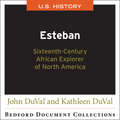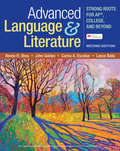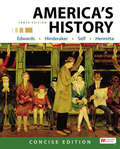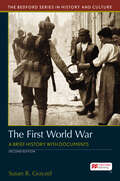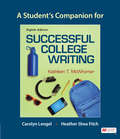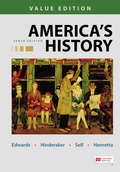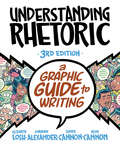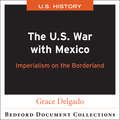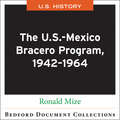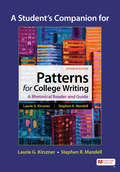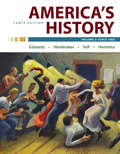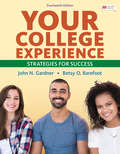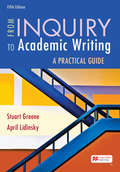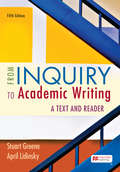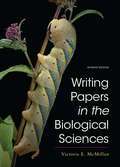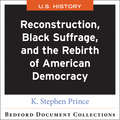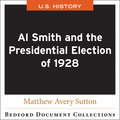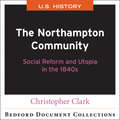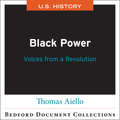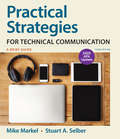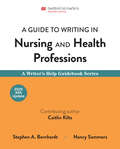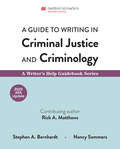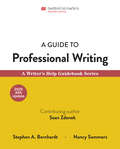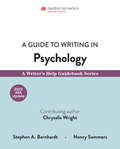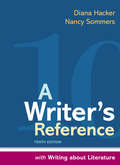Special Collections
Benetech’s Global Certified Accessible Titles
Description: Benetech’s GCA program is the first independent third-party EPUB certification to verify ebook accessibility. By creating content that is born accessible, publishers can meet the needs of all readers. Learn more: https://bornaccessible.benetech.org/
- Table View
- List View
Esteban: Sixteenth-Century African Explorer of North America
by Kathleen DuVal and John DuValThe documents in this collection introduce the story of Esteban, one of the first people of African descent to visit what today is the United States. Students will engage with a wide range of primary sources, constructing an argument based on the central question: What do descriptions of Esteban’s explorations tell us about slavery, race, and first encounters in sixteenth-century North America? Given the limited nature of these sources, what can we never know? Students are guided in their analyses of the documents by a learning objective, central question, historical background, source headnotes, source questions, project questions and suggestions for further research. Through their work with these sources, they will gain a deeper awareness of the diversity of the American experience, a more complete understanding of the present in an historically-based context, an enhanced ability to read, interpret, assess, and contextualize primary sources, and practice explaining historical change over time.
Advanced Language & Literature
by Renee H. Shea and John Golden and Lance Balla and Carlos EscobarRegardless of their preparation level, Advanced Language & Literature is designed to take your students to the next level. Students will find that the instruction in this book meets them where they are with differentiated texts, step-by-step instruction, and brief accessible activities, and then continues forward to challenge them to grow as readers, writers, and thinkers.
America’s History
by James A. Henretta and Rebecca Edwards and Robert O. Self and Eric HinderakerPraised for its focus on turning points and engines of change, the Concise Edition of America’s History explains the why behind events. The tenth edition presents a greater variety of tools to engage today's students. This edition includes new part opener features to help students study change and continuity in key periods, new coverage of capitalism and the economy, and an enhanced primary and secondary source program designed to develop historical thinking skills.
The First World War
by Susan GrayzelA brief but thorough collection, Susan Grayzel’s new revision of The First World War document reader allows students to experience this historical turning point through various sources from the period and the scholarship tied to them.
A Student's Companion for Successful College Writing
by Carolyn Lengel and Kathleen McWhorter and Heather FitchDesigned to support students who are learning to navigate college and first-year composition at the same time, A Student’s Companion for Successful College Writing includes: College success materials that help students build confidence, manage time effectively, and write ethically and responsibly Additional activities designed to help students develop, draft, and revise writing projects for each chapter in Parts 3 and 4 of Successful College Writing Sentence guides for academic writing that give students a jumping-off point as they learn to present and respond to the ideas of others Editing activities for students who need extra practice in correcting common writing problems, such as comma splices and fragments A Student’s Companion is the perfect text for students taking a co-requisite (or ALP) writing course.
America's History, Value Edition, Combined Volume
by Rebecca Edwards and Eric Hinderaker and James Henretta and Robert SelfAmerica’s History explains WHY events occurred, not just when. Students are provided an analytical and big-picture approach to American history in an affordable format.
Understanding Rhetoric
by Jonathan Alexander and Elizabeth Losh and Kevin Cannon and Zander CannonAfter shaking up writing classrooms at more than 550 colleges, universities, and high schools, Understanding Rhetoric, the comic-style guide to writing, has returned for a third edition! Understanding Rhetoric encourages deep engagement with core concepts of writing and rhetoric. With brand-new coverage of fake news, sourcing the source, podcasting as publishing, and support for common writing assignments, the new edition of the one and only composition comic covers what students need to know—and does so with fun and flair.
The U.S. War with Mexico
by Grace DelgadoThis document collection looks at the decades leading up to the U.S. war with Mexico from multiple perspectives. Students will engage with a wide range of primary sources, constructing an argument based on the central question: What does the contest for lands at the U.S. border with Mexico reveal about America’s imperialist ambitions? Students are guided in their analyses of the documents by a learning objective, central question, historical background, source headnotes, source questions, project questions and suggestions for further research. By analyzing texts and images with such different perspectives, students will gain an understanding of how historians interpret, assess, and contextualize primary sources. This unit will also add to students’ understanding of the present in a historically based context.
The U.S.-Mexico Bracero Program
by Ronald MizeThis document collection will introduce students to the U.S.-Mexico Bracero program and the experiences of those who labored within it. Students will engage with a wide range of primary sources, constructing an argument based on the central question: How did the nation’s first and largest guest worker program establish the context for the U.S. treatment Mexican labor migrants? Students are guided in their analyses of the documents by a learning objective, central question, historical background, source headnotes, source questions, project questions and suggestions for further research. Through their work with these sources, they will gain a deeper awareness of the diversity of the American experience, a more complete understanding of the present in an historically-based context, an enhanced ability to read, interpret, assess, and contextualize primary sources, and practice explaining historical change over time.
A Student's Companion for Patterns for College Writing
by Laurie Kirszner and Stephen MandellFor students who need a little extra support, A Student’s Companion for Patterns for College Writing reinforces the most foundational elements in academic writing. This supplement breaks down the steps necessary to excel in college writing while recognizing and respecting students’ abilities. The second edition of this companion volume has been updated to add what instructors have asked us for: more grammar coverage, more sample student papers, and more hands-on practice in the processes of writing and re-writing. It’s the perfect resource for corequisite composition support courses.
America's History, Volume 2
by Rebecca Edwards and Eric Hinderaker and James Henretta and Robert SelfAmerica’s History explains WHY events occurred, not just when. Students are provided an analytical and big-picture approach to American history with a plethora of support tools to help determine what’s most important.
Your College Experience
by John Gardner and Betsy BarefootHelping students succeed in their college experienceWith a clear presentation of the practical information you need to succeed in your first year of college and beyond, Your College Success provides an in-depth treatment of those topics important for all college students, including motivation, time and money management, mental health and more.
From Inquiry to Academic Writing
by Stuart Greene and April LidinskyAvailable for the first time with Macmillans new online learning tool, Achieve, From Inquiry to Academic Writing: A Practical Guide helps students understand academic culture and its ways of thinking, reading, and writing. With a practical and widely proven step-by-step approach, the text demystifies cross-curricular reading, thinking, and writing. Thirteen chapters of rhetorical instruction introduce students to college-level inquiry, analysis, and argument with 28 integrated readings on interdisciplinary topics. The fifth edition includes nine new readings and increased emphasis on using critical thinking and critical reading to evaluate multiple perspectives and stretch beyond the binary thinking of today’s public discourse. Achieve for From Inquiry to Academic Writing is a dedicated composition space that guides students through drafting, peer review, source check, reflection, and revision.
From Inquiry to Academic Writing
by Stuart Greene and April LidinskyFrom Inquiry to Academic Writing. Interesting readings from across the disciplines combine with a step-by-step approach you can apply to your own writing inside and outside of academia.
Writing Papers in the Biological Sciences
by Victoria McMillanWriting in the Biological Sciences is a handy reference that new to advanced students can readily use on their own. A variety of student models prepare you for the most common writing assignments in undergraduate biology courses.
Reconstruction, Black Suffrage, and the Rebirth of American Democracy
by K. Stephen Prince and Bedford/St.Martin'sThe documents in this collection illustrate the struggle over black voting rights during Reconstruction and the remarkable lengths to which African Americans have gone to secure these rights. Students will engage with a wide range of primary sources, constructing an argument based on the central question: What were the causes and consequences of the Reconstruction-era expansion of voting rights, and how did black suffrage change the face of American democracy? Students are guided in their analyses of the documents by a learning objective, central question, historical background, source headnotes, source questions, project questions, and suggestions for further research. Through their work with these documents, they will gain a deeper awareness of the diversity of the American experience, a more complete understanding of the present in an historically-based context, an enhanced ability to read, interpret, assess, and contextualize primary sources, and practice explaining historical change over time.
Al Smith and the Presidential Election of 1928
by Matthew Avery SuttonThis collection brings together documents from Al Smith’s supporters and detractors in months leading up to the election of 1928. After completing the unit, students should be able to construct an argument that addresses the central question: How does Al Smith’s failed presidential bid illuminate the controversies raging in the United States at the time over questions of race, immigration, religion, urbanization, politics, and the consumption of alcohol? Students are guided in their analyses of the documents by a learning objective, central question, historical background, source headnotes, source questions, project questions, and suggestions for further research. Through their work with these documents, they will gain a deeper awareness of the diversity of the American experience, a more complete understanding of the present in an historically-based context, an enhanced ability to read, interpret, assess, and contextualize primary sources, and practice explaining historical change over time.
The Northampton Community
by Bedford/St.Martin's and Christopher ClarkThis document collection offers insights into the aspirations, life, and practical aspects of an American utopian community of the 1840s. Students will engage with a wide range of primary sources, constructing an argument based on the central question: What does the Northampton Community’s example reveal about the goals and experiences of American utopian communities in the 1840s? Students are guided in their analyses of the documents by a learning objective, central question, historical background, source headnotes, source questions, project questions and suggestions for further research. Through their work with these sources, they will gain a deeper awareness of the diversity of the American experience, a more complete understanding of the present in an historically-based context, an enhanced ability to read, interpret, assess, and contextualize primary sources, and practice explaining historical change over time.
Black Power
by Thomas AielloThis document collection will introduce students to the history, philosophy, and goals of the Black Power movement through the words and images of its leading figures. Students will engage with a wide range of primary sources, constructing an argument based on the central question: How did the rhetoric of Black Power reimagine the relationship between African Americans and white people in the wake of the integrationist civil rights movement? Students are guided in their analyses of the documents by a learning objective, central question, historical background, source headnotes, source questions, project questions, and suggestions for further research. Through their work with these documents, they will gain a deeper awareness of the diversity of the American experience, a more complete understanding of the present in an historically-based context, an enhanced ability to read, interpret, assess, and contextualize primary sources, and practice explaining historical change over time.
Practical Strategies for Technical Communication
by Stuart A. Selber and Mike MarkelWith 2020 APA Update. In today’s constantly changing workplace, it’s important to keep up with strategies for successful communication, whether it happens through email, websites, presentations, social media, or cover letters. Practical Strategies for Technical Communication helps get students up to speed with a concise, accessible guide to everything they need to know about audience and purpose, document design, research, style, and more. In the third edition, noted scholar and teacher Stuart A. Selber joins the author team. The new edition features expanded coverage of nontraditional resume formats such as infographics and videos, a new discussion of usability testing, and an array of revised and updated Tech Tips. Practical Strategies for Technical Communication is available with LaunchPad– a customizable course space featuring an ebook and an exciting array of digital resources including a test bank, adaptive quizzing, multimedia Document Analysis Activities, and more. To order or purchase the print book packaged with LaunchPad, use ISBN 978-1-319-22438-7.
A Guide to Writing in Nursing and Health Professions with 2020 APA Update
by Nancy Sommers and Stephen A. BernhardtA Guide to Writing in Nursing and Health Professions, part of the Writer’s Help Guidebook Series, offers writing and research support for students writing in the discipline. This compact yet comprehensive guidebook provides the value students want with the essential instruction they need to complete writing tasks successfully. Students will find advice on how to think, read, research, and design and write papers, and projects and presentations like a nurse or health professional.Coverage includes the following topics, all focused on the specific needs of writers in nursing and health professions:Writing processConventions in the disciplineIntegrating and evaluating sourcesDocumentation style required in the discipline--with plenty of modelsSample student writing
A Guide to Writing in Criminal Justice and Criminology with 2020 APA Update
by Nancy Sommers and Stephen A. BernhardtA Guide to Writing in Criminal Justice and Criminology, part of the Writer’s Help Guidebook Series, offers writing and research support for students writing in the discipline. This compact yet comprehensive guidebook provides the value students want with the essential instruction they need to get their writing tasks completed successfully. Students will find advice on how to think, read, research, design and write papers, projects and presentations like a criminal justice professional or criminologist.Coverage includes the following topics, all focused on the specific needs of writers in criminal justice or criminology:Writing processConventions in the disciplineIntegrating and evaluating sourcesDocumentation style required in the discipline--with plenty of modelsSample student writing
A Guide to Professional Writing with 2020 APA Update
by Nancy Sommers and Stephen A. BernhardtA Guide to Professional Writing, part of the Writer’s Help Guidebook Series, offers writing and research support for students writing in the discipline. This compact yet comprehensive guidebook provides the value students want with the essential instruction they need to get their writing tasks completed successfully. Students will find advice on how to think, read, research, design and write papers, projects and presentations like a professional writer. Coverage includes the following topics, all focused on the specific needs of professional writers:Writing processConventions in the disciplineIntegrating and evaluating sourcesDocumentation style required in the discipline--with plenty of modelsSample student writing
A Guide to Writing in Psychology with 2020 APA Update
by Nancy Sommers and Stephen A. BernhardtA Guide to Professional Writing, part of the Writer’s Help Guidebook Series, offers writing and research support for students writing in the discipline. This compact yet comprehensive guidebook provides the value students want with the essential instruction they need to get their writing tasks completed successfully. Students will find advice on how to think, read, research, design and write papers, projects and presentations like a professional writer. Coverage includes the following topics, all focused on the specific needs of professional writers:Writing processConventions in the disciplineIntegrating and evaluating sourcesDocumentation style required in the discipline--with plenty of modelsSample student writing
A Writer's Reference with Writing about Literature
by Diana Hacker and Nancy SommersWriting about Literature is a practical guide to interpreting works of literature and to planning, composing, and documenting papers about literature. Students will find help with forming and supporting an interpretation, avoiding plot summary, integrating quotations from a literary work, observing the conventions of literature papers, and using secondary sources. Writing about Literature also includes two sample student essays — one that uses only a primary source and one that uses primary and secondary sources.
